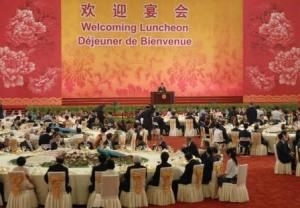Lavish Lifestyles: Chinese Government Officials Sidestep Rules Calling For Austerity

China’s new president, Xi Jinping, has ushered in a new style of leadership focusing on cutting back on many of the lavish benefits that Chinese government officials have long enjoyed and become accustomed to.
Now, senior Chinese officials who have been forced to endure such cutbacks are finding ways around the central government’s new austerity plans.
According to the South China Morning Post, officials from four different provinces said that the extravagant, expensive banquets (and other perks) that have since been banned have merely taken on a new form and are possibly even more over-the-top than before.
Earlier this year, everyone from hoteliers, restaurant owners, caterers and even florists saw their businesses hurt by the government streamlining and simplifying its practices, by, among other things, doing away with such luxuries as official car convoys, red carpets, flowers, etc. Now, for example, government officials in Fujian province said that they were willing to eat and hold meetings in their canteens instead of expensive restaurants -- however, only after they made a few costly upgrades to said "canteens."
Indeed, renovations in the canteens included a total overhaul, in effect replicating the ambience of five-star restaurants with private rooms and even fine-dining chefs. Now officials did not have to venture far to get their fix of the perks that come with being a high-level official.
“No need for officials to go out to dine under the eyes of the public, because everything can be done within the government compound,” one unnamed Fujian official said in the report.
But they are not the only ones.
The source revealed to the South China Morning Post that many other provinces have also caught on to the loophole and have started spending internally.
“Such renovation is not only happening in Fujian but in many provinces around the country,” the official said. “There are plenty of ways at the local level for cities to get around rules from the top.”
Xi’s new austerity plans have been viewed as a gesture of solidarity with the masses, in a nation with an ever-widening income gap between the rich and the poor. This policy, the government hopes, will also reduce the problem of corruption that runs rampant among the political class.
However, some Chinese government officials are not convinced the new belt-tightening campaign will work.
“The call for austerity is too harsh. ... It is typical communist style that a movement can appear all of a sudden and require all party members to learn the unselfish and noble spirit of revolutionary ancestors,” another unnamed Fujian official said. “But who can really do that in today’s China?”
© Copyright IBTimes 2025. All rights reserved.






















